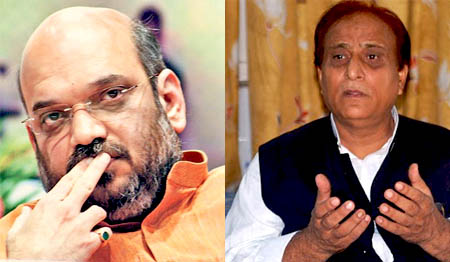Ghaziabad, Apr 13: A day after the Election Commission banned BJP leader Amit Shah and Uttar Pradesh Minister Mohammad Azam Khan from holding public meetings and rallies and directed the U.P. government to initiate criminal proceedings against the duo, two FIRs were lodged against each of them on Saturday.
 Both the FIRs against Mr. Shah were registered in Muzaffarnagar district. The cases were lodged under Sections 123 (3) of the Representation of the People Act (appeal by a candidate or his agent...to vote on the grounds of his religion, race caste, community or language) and Section 188 of the IPC (disobedience of order duly promulgated by a public servant).
Both the FIRs against Mr. Shah were registered in Muzaffarnagar district. The cases were lodged under Sections 123 (3) of the Representation of the People Act (appeal by a candidate or his agent...to vote on the grounds of his religion, race caste, community or language) and Section 188 of the IPC (disobedience of order duly promulgated by a public servant).
"A compliance report has been sent to the Government," Muzaffarnagar District Magistrate Kaushal Raj Sharma told The Hindu.
Two FIRs were also registered against Mr. Khan, one each in Ghaziabad and Shamli districts.
The FIR against Mr. Khan in Ghaziabad was filed under Sections 153 A (promoting enmity between different groups on ground of religion, race), 153 B (imputations and assertions prejudicial to national integration) and 295 A (deliberate and malicious act to outrage religious feelings) of the IPC.
In Shamli, the Minister was booked for making an alleged "hate speech" in Jalalabad on April 9.
Samajwadi Party president Mulayam Singh and U.P. Chief Minister Akhilesh Yadav came out in support of Mr Khan.
Describing Mr. Khan as a "secular leader," Mr. Singh said the ban was wrong.
Addressing an election meeting in Faridpur in Aonla parliamentary constituency, Mr. Singh appealed to the Election Commission to reconsider its decision and allow Mr. Khan to participate in electioneering.
'EC did not wait for reply'
Support for Mr. Khan also came from Chief Minister Akhilesh Yadav, who said that the Election Commission imposed the ban without waiting for Mr. Khan’s reply.
The ban on Mr. Khan has seemingly come as a rude shock for the SP. Not only is he the Muslim face of the party, Mr. Khan is also known for his oratory.







Comments
Add new comment